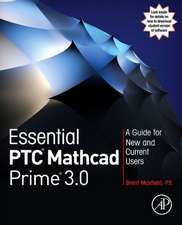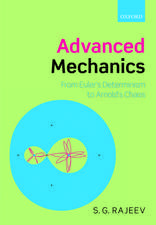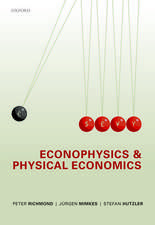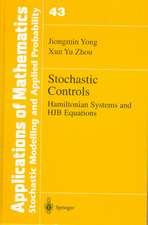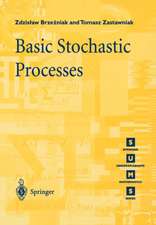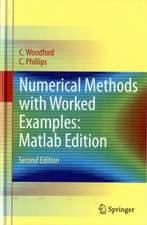Fuzzy Preference Ordering of Interval Numbers in Decision Problems: Studies in Fuzziness and Soft Computing, cartea 238
Autor Atanu Sengupta, Tapan Kumar Palen Limba Engleză Hardback – 13 mar 2009
The present research work consists of two closely related fields: approaches towards defining a generalized preference ordering scheme for interval attributes and approaches to deal with some issues having application potential in many areas of decision making.
| Toate formatele și edițiile | Preț | Express |
|---|---|---|
| Paperback (1) | 634.68 lei 6-8 săpt. | |
| Springer Berlin, Heidelberg – 21 oct 2010 | 634.68 lei 6-8 săpt. | |
| Hardback (1) | 640.88 lei 6-8 săpt. | |
| Springer Berlin, Heidelberg – 13 mar 2009 | 640.88 lei 6-8 săpt. |
Din seria Studies in Fuzziness and Soft Computing
- 20%
 Preț: 999.85 lei
Preț: 999.85 lei - 20%
 Preț: 653.06 lei
Preț: 653.06 lei - 20%
 Preț: 872.96 lei
Preț: 872.96 lei - 20%
 Preț: 930.57 lei
Preț: 930.57 lei - 20%
 Preț: 1051.00 lei
Preț: 1051.00 lei - 20%
 Preț: 992.44 lei
Preț: 992.44 lei - 20%
 Preț: 655.85 lei
Preț: 655.85 lei - 20%
 Preț: 1001.86 lei
Preț: 1001.86 lei - 18%
 Preț: 954.14 lei
Preț: 954.14 lei - 20%
 Preț: 330.10 lei
Preț: 330.10 lei - 20%
 Preț: 333.04 lei
Preț: 333.04 lei - 20%
 Preț: 997.56 lei
Preț: 997.56 lei -
 Preț: 391.61 lei
Preț: 391.61 lei - 20%
 Preț: 647.79 lei
Preț: 647.79 lei - 20%
 Preț: 986.01 lei
Preț: 986.01 lei - 18%
 Preț: 958.56 lei
Preț: 958.56 lei - 20%
 Preț: 996.40 lei
Preț: 996.40 lei - 20%
 Preț: 999.35 lei
Preț: 999.35 lei - 15%
 Preț: 646.43 lei
Preț: 646.43 lei - 20%
 Preț: 651.57 lei
Preț: 651.57 lei - 20%
 Preț: 997.89 lei
Preț: 997.89 lei - 15%
 Preț: 641.03 lei
Preț: 641.03 lei - 20%
 Preț: 1009.74 lei
Preț: 1009.74 lei - 20%
 Preț: 992.62 lei
Preț: 992.62 lei -
 Preț: 388.72 lei
Preț: 388.72 lei - 18%
 Preț: 1223.43 lei
Preț: 1223.43 lei - 20%
 Preț: 651.42 lei
Preț: 651.42 lei - 18%
 Preț: 951.59 lei
Preț: 951.59 lei - 18%
 Preț: 948.61 lei
Preț: 948.61 lei
Preț: 640.88 lei
Preț vechi: 753.97 lei
-15% Nou
Puncte Express: 961
Preț estimativ în valută:
122.63€ • 127.79$ • 101.54£
122.63€ • 127.79$ • 101.54£
Carte tipărită la comandă
Livrare economică 03-17 aprilie
Preluare comenzi: 021 569.72.76
Specificații
ISBN-13: 9783540899143
ISBN-10: 3540899146
Pagini: 180
Ilustrații: XII, 166 p.
Dimensiuni: 155 x 235 x 19 mm
Greutate: 0.43 kg
Ediția:2009
Editura: Springer Berlin, Heidelberg
Colecția Springer
Seria Studies in Fuzziness and Soft Computing
Locul publicării:Berlin, Heidelberg, Germany
ISBN-10: 3540899146
Pagini: 180
Ilustrații: XII, 166 p.
Dimensiuni: 155 x 235 x 19 mm
Greutate: 0.43 kg
Ediția:2009
Editura: Springer Berlin, Heidelberg
Colecția Springer
Seria Studies in Fuzziness and Soft Computing
Locul publicării:Berlin, Heidelberg, Germany
Public țintă
ResearchCuprins
On Comparing Interval Numbers: A Study on Existing Ideas.- Acceptability Index and Interval Linear Programming.- Fuzzy Preference Ordering of Intervals.- Solving the Shortest Path Problem with Interval Arcs.- Travelling Salesman Problem with Interval Cost Constraints.- Interval Transportation Problem with Multiple Penalty Factors.- Fuzzy Preference based TOPSIS for Interval Multi-criteria Decision Making.- Concluding Remarks and the Future Scope.
Recenzii
From the reviews:
“This research monograph is concerned with modeling fuzzy preference ordering in the frame- work of decision-making. … The fuzzy preference – based TOPSIS is discussed as well. Overall, the book is a concise and useful treatment of preference handing in uncertain decision-making problems. The wealth of the illustrative numeric material is a useful feature of the book.” (Witold Pedryez, Zentralblatt MATH, Vol. 1169, 2009)
“This research monograph is concerned with modeling fuzzy preference ordering in the frame- work of decision-making. … The fuzzy preference – based TOPSIS is discussed as well. Overall, the book is a concise and useful treatment of preference handing in uncertain decision-making problems. The wealth of the illustrative numeric material is a useful feature of the book.” (Witold Pedryez, Zentralblatt MATH, Vol. 1169, 2009)
Textul de pe ultima copertă
In conventional mathematical programming, coefficients of problems are usually determined by the experts as crisp values in terms of classical mathematical reasoning. But in reality, in an imprecise and uncertain environment, it will be utmost unrealistic to assume that the knowledge and representation of an expert can come in a precise way. The wider objective of the book is to study different real decision situations where problems are defined in inexact environment. Inexactness are mainly generated in two ways – (1) due to imprecise perception and knowledge of the human expert followed by vague representation of knowledge as a DM; (2) due to huge-ness and complexity of relations and data structure in the definition of the problem situation. We use interval numbers to specify inexact or imprecise or uncertain data. Consequently, the study of a decision problem requires answering the following initial questions – How should we
- compare and define preference ordering between two intervals?
- interpret and deal inequality relations involving interval coefficients?
- interpret and make way towards the goal of the decision problem?
Caracteristici
Studies real decision situations where problems are defined in inexact environment Presents recent research in Fuzzy Preference Ordering of Interval Numbers and Modelling of Interval Decision Problems Includes supplementary material: sn.pub/extras

